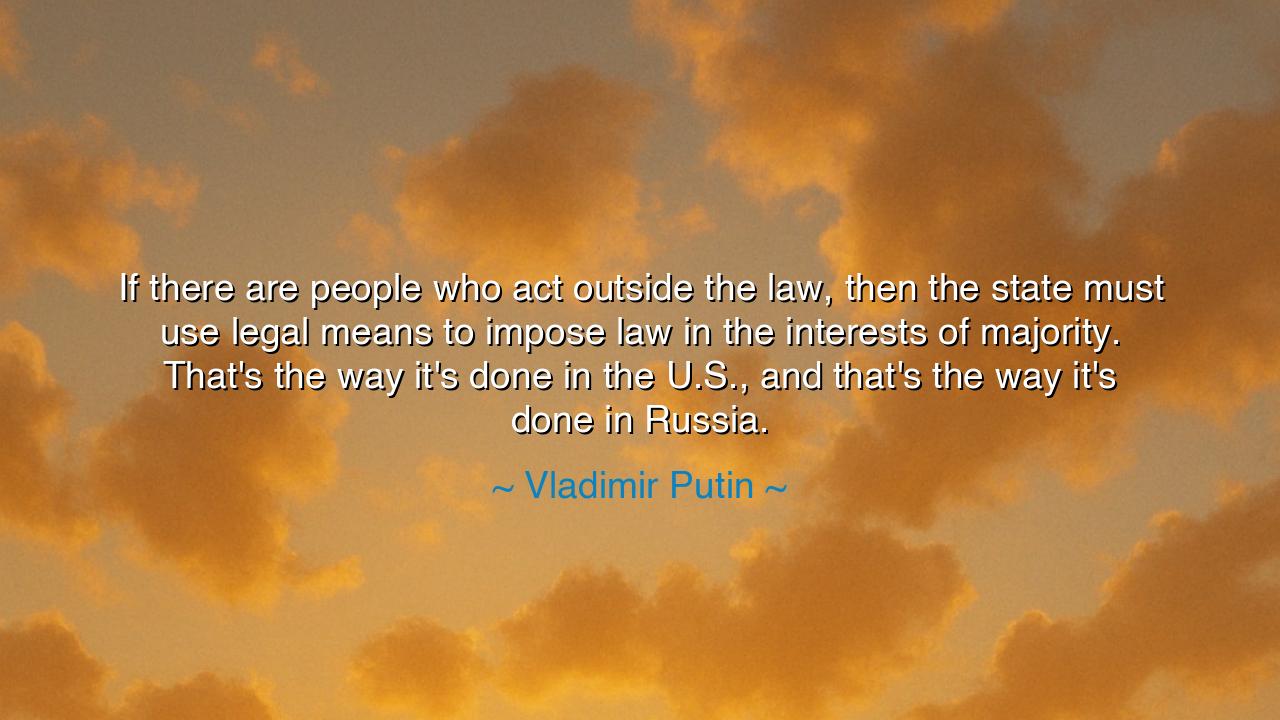
If there are people who act outside the law, then the state must
If there are people who act outside the law, then the state must use legal means to impose law in the interests of majority. That's the way it's done in the U.S., and that's the way it's done in Russia.






Hearken, O seekers of wisdom, to the words of Vladimir Putin, who declared: "If there are people who act outside the law, then the state must use legal means to impose law in the interests of the majority. That’s the way it’s done in the U.S., and that’s the way it’s done in Russia." In these words lies a reflection on power, justice, and the eternal struggle between order and freedom. It is a statement that evokes both the noble ideals of governance and the perilous edge where authority meets coercion.
Since the earliest days of civilization, rulers and philosophers alike have wrestled with the meaning of law. To the ancients, law was not merely the decree of the powerful, but the harmony that bound the city together. In Athens, Solon established laws to restrain both the tyrant and the mob, seeking balance between individual freedom and the collective good. Putin’s words echo this ancient dilemma: how does a state maintain order without extinguishing liberty? How does it confront those who act “outside the law” while ensuring that its methods remain legal and just?
The heart of his declaration rests upon the phrase “in the interests of the majority.” This principle, though seemingly virtuous, has carried both glory and danger through the ages. The philosopher Aristotle warned that democracy can decay when the majority’s will becomes a tool for suppressing dissent, transforming law from protector into weapon. Yet he also affirmed that the stability of any polity rests upon the contentment of its many citizens, for when the multitude suffers, the realm fractures. Putin’s statement, then, stands upon this knife’s edge: the state must protect the whole, but must do so with legal means, lest its power become tyranny cloaked in righteousness.
Consider the tale of Marcus Aurelius, the philosopher-emperor of Rome. Confronted with corruption, rebellion, and lawlessness, he refused to act in anger or cruelty. He sought always to align the might of the state with the justice of reason, reminding his governors that the power to punish is sacred and perilous. “Let it never be said,” he wrote, “that the Emperor’s law is vengeful.” His was the embodiment of what Putin’s words aspire to: the use of law not as an instrument of oppression, but as a disciplined means of restoring order.
And yet, history warns that even noble intentions may harden into absolutism. The invocation of “the majority” can justify great suffering when wielded without restraint. The French Revolution began with promises of equality and justice, but its leaders—claiming to act in the name of the people—used law to silence the very liberties they had sworn to protect. The Reign of Terror proved that even the cry of justice, when untethered from moral restraint, can become a sword turned inward.
From this reflection emerges a lesson for all ages: law is not merely the command of rulers, nor the cry of the masses, but the living covenant between people and power. To uphold it requires wisdom, restraint, and constant vigilance. The state may act to restore order, but it must never forget that its authority draws legitimacy only from its adherence to the principles it claims to defend. For when legal means become a veil for arbitrary force, the very spirit of justice perishes beneath the weight of its own machinery.
O seekers of truth, take this teaching to heart. In every nation, every community, there will be those who test the limits of law and those who wield it. The challenge is not to abolish power, but to govern it—to ensure that the pursuit of order does not devour the essence of justice. Support laws that are clear, fair, and humane; question those that serve only the convenience of rulers or the passions of the crowd.
For in the end, the true strength of a state is not measured by its ability to punish, but by its ability to remain just while wielding power. When the law is both firm and fair—guided by reason, tempered by mercy, and grounded in the will of all—the realm stands secure. Thus may every leader, every citizen, and every generation remember: justice without law is chaos, but law without justice is tyranny.






AAdministratorAdministrator
Welcome, honored guests. Please leave a comment, we will respond soon